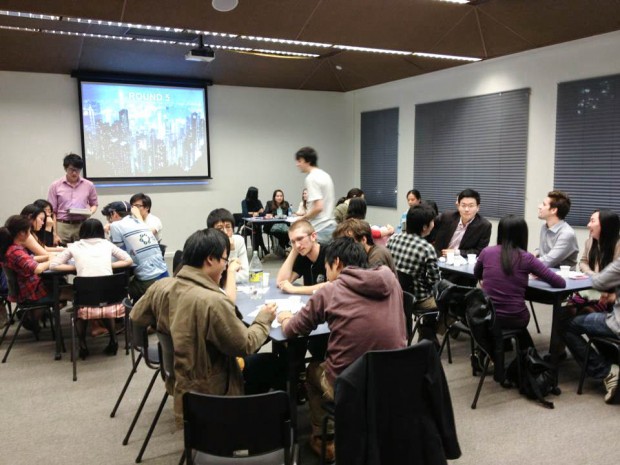Language Connection and the importance of inclusiveness in learning a new language
SPEAKING to Language Connection’s Managing Director Will Breedon, we discuss the organisation’s aim to maintain a social and fun community for language learners to exchange and improve their language proficiencies. Nicole Tee has more.

Learning in a social environment – one of the key aims of Language Connection which has formed their success. | Image: Language Connection Facebook Page
Every Thursday and Saturday, a diverse group of people from different nationalities gather together to converse in Mandarin, Korean, Japanese and English. This happens concurrently in the same room.
Having learnt a bit of Japanese, I walked towards the Japanese exchange table, and was introduced to Kaoru-san, a Japanese lady wearing a short bob. She asked if I had learned Japanese before, to which I replied, “a little”. She took out a piece of paper, before proceeding to converse with me in Japanese, occasionally writing down words or phrases I was unsure of for my reference.
Alongside me, about 40 other participants were conversing with each other, practicing their native language or languages they were learning. Without the interruption of of textbooks or teachers, it was made to feel like people could learn in a relaxed and social environment.
“Language Connection has been instrumental in making me feel like wherever people go, [it] is very welcoming.”
This scene is common to Language Connection. Since 2010, this language exchange group has grown from a two-person language exchange in Melbourne University to a group that now boasts more than 2,000 members.
The brainchild of a few local students who wanted a platform where they could learn Chinese and Japanese, Language Connection today has expanded to attract international students, people on working holiday visas in Australia and people with Asian backgrounds who have lived in Australia for long periods of time.
The not-for-profit organisation currently consists of 50 volunteers, many of whom help to contribute to the facilitation of sessions, the improvement of business development and volunteer coordination. In addition to this team of volunteers, a board of directors from different industries are available to provide strategic vision and ensure mission for social betterment is maintained.

Breedon (second from left) and some of the volunteers at the recent Tanabata Festival. | Image supplied
Part of Language Connection’s success has been its sense of inclusiveness, which Managing Director Will Breedon feels has ensured visitors learn and develop language proficiency in a safe and supportive environment.
“Language Connection has been instrumental in making me feel like wherever people go, [it] is very welcoming,” Breedon said.
When he first started learning Japanese, Breedon recalled his lack of confidence to even say konnichiwa (hello in Japanese) because he was afraid of distorting the original pronunciation of the word. After finding people who were in a similar situation as him however, Breedon found support which helped boost his confidence in practicing the language.
“You can’t necessarily find [such support] in school or in university since you’ve got a teacher there, and the teacher is not necessarily your best audience for your linguistic capabilities,” Breedon said.
“If it was just an Australian team, we wouldn’t have [insight], specially in terms of being able to sympathise with international students and understand [and be familiar] with what international students might expect.”
This was the case for Language Connection when it first started out as people came in expecting a structured class where they could learn the language of their choice. Over time, it evolved into a fun and social platform for people to speak in the languages they were learning.
“Before and after [sessions], you would have people meeting up in the city, going for a coffee, coming for Language Connection and going for dinner afterwards. On Thursdays, you would get a good group of people going for Korean barbeque, [and] going for hotpot,” Breedon said.

At an Australian Football League Social Event: New friendships are integral to Language Connection’s exchanges. | Image: Language Connection Facebook Page.
Given the cultural makeup of Language Connection’s volunteers and members, the organisation has also prided itself on cultivating understanding and appreciation for people from different cultures and education backgrounds.
“If it was just an Australian team, we wouldn’t have [insight], specially in terms of being able to sympathise with international students and understand [and be familiar with] with what international students might expect,” Breedon admits.
To facilitate this, Language Connection has in the past introduced events and cultural programmes such as the recent Japanese Tanabata Festival which have assisted in allowing for real and long-term friendships to be fostered.
As a result, these exchanges have helped position the organisation as a contributor to Australia’s ideal of a global citizenship.
“Language Connection creates that network which simultaneously looks for people and also brings them in.”
In the long run, Breedon envisions that through these language exchanges, Melbourne could potentially become a city that rivals Tokyo and Suzhou for its sense of inclusiveness.
“Networks have this way of self-replicating,” says Breedon.
“Language Connection creates that network which simultaneously looks for people and also brings them in.”
With Language Connection’s warm sense of inclusiveness in learning and multicultural makeup, perhaps it can help Melbourne one day reach the potential to become one of the most inclusive cities in the world.
Language Connection’s sessions run every Thursday and Saturday. Visit their website for more information.
